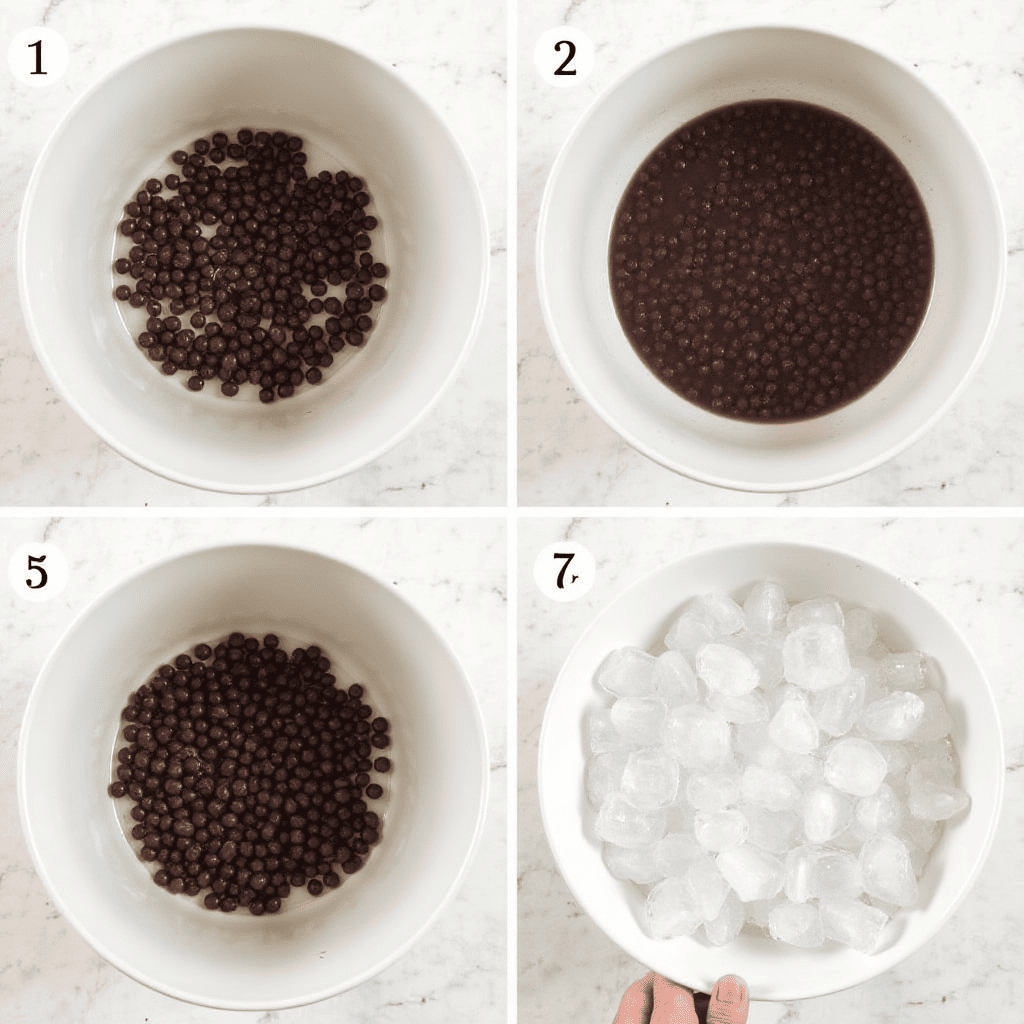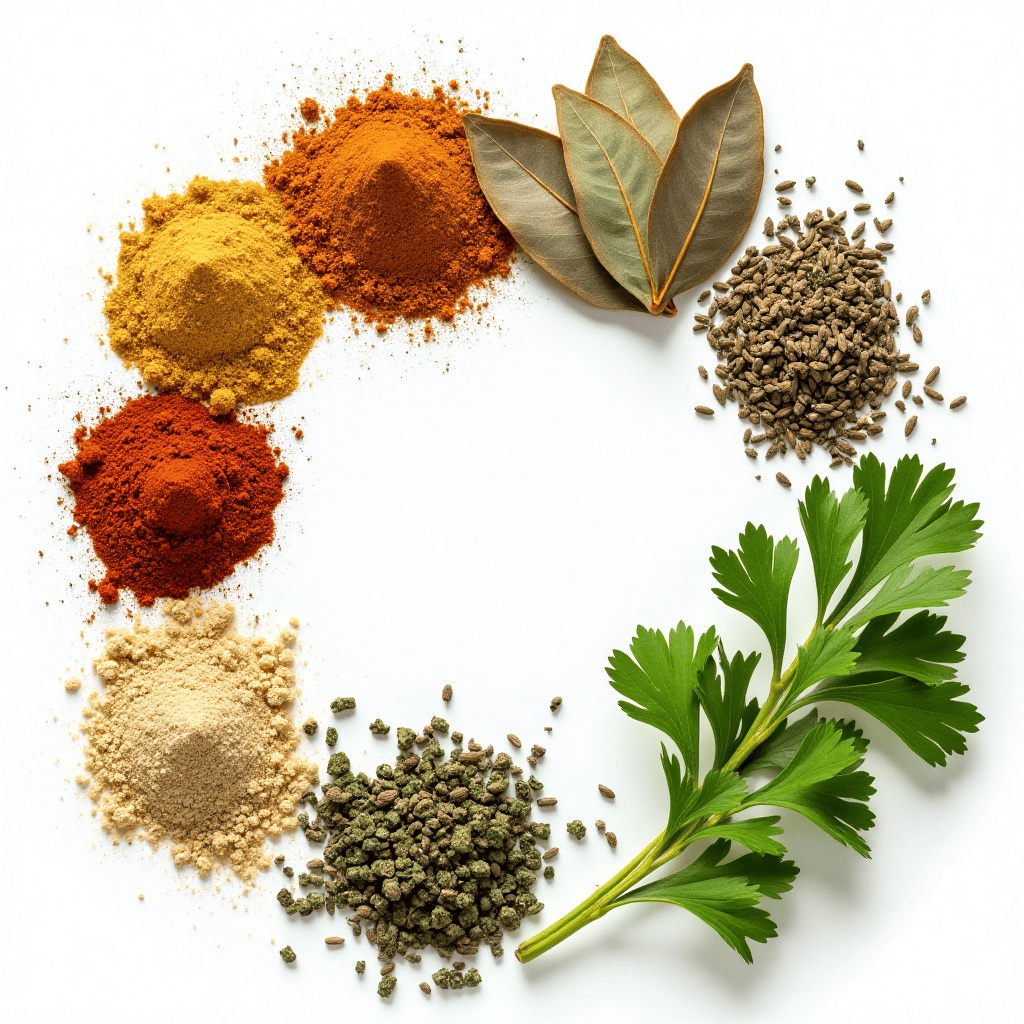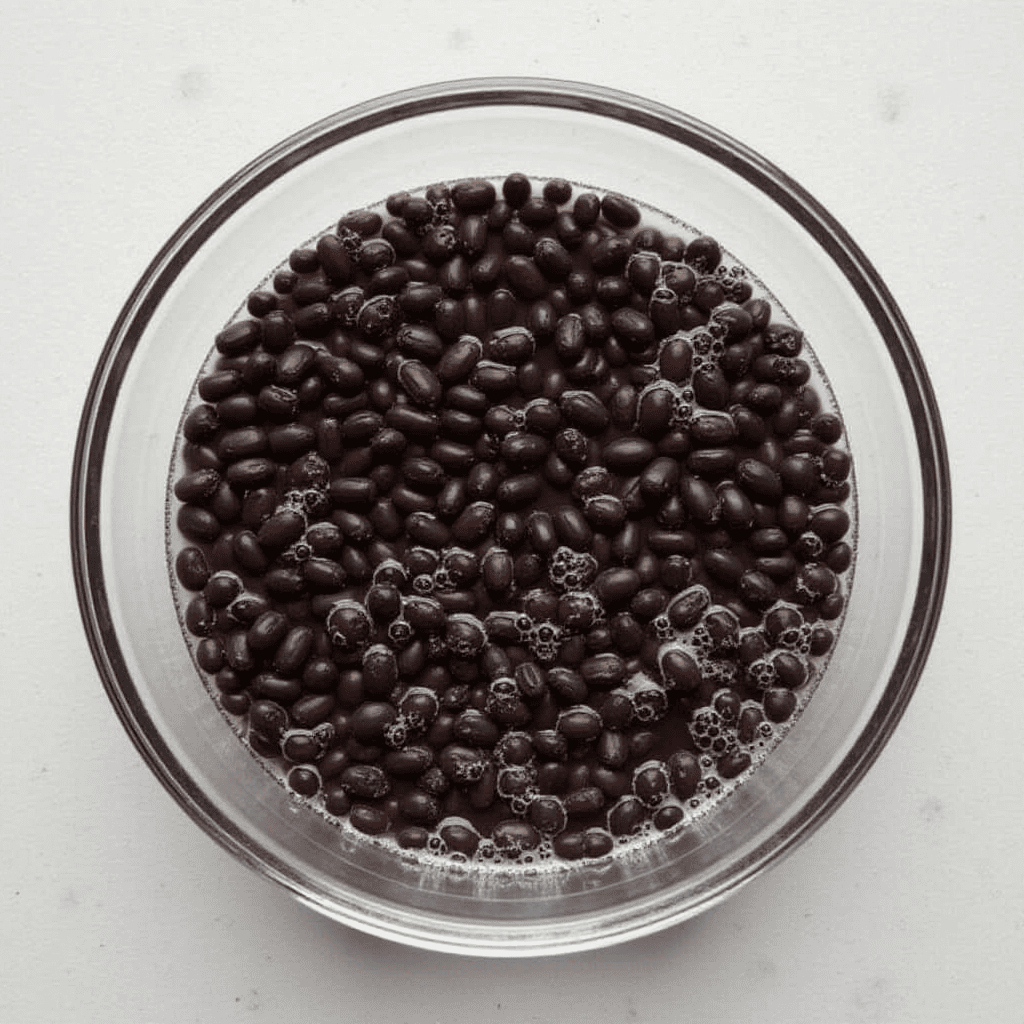Table of Contents
Understanding the Bitter Taste in Black Bean Soup
Causes of Bitterness in Black Bean Soup
If you want to remove bitterness in black bean soup, it’s important to understand the common causes of bitterness. Overcooking black beans can release tannins, which contribute to the bitter flavor. Using low-quality or old ingredients, like stale beans or rancid spices, can also negatively affect the soup’s taste. Additionally, excessive use of bitter herbs, such as cumin or garlic, without balancing them with other flavors can overwhelm the dish.
To learn more, check out recipes like the Purple Black Bean Soup Recipe, which provides tips on balancing flavors while retaining their delicious essence.
Ditch Dinner Stress — Cook Smart, Not Hard 🍽️
35 quick & budget-friendly 5-ingredient dinners to save your evenings. Simple. Delicious. Ready in 30 minutes or less.
Overcooking Black Beans: A Key Contributor
One of the most common causes of bitterness in black bean soup is overcooking the beans. When black beans are cooked for too long, their natural compounds, such as tannins and saponins, can break down and intensify, leading to a bitter taste. To avoid this, cook the beans just until tender, and avoid excessively high heat for extended periods.
Using Low-Quality Ingredients
Low-quality or stale ingredients can also contribute to an undesirable bitterness in black bean soup. Old black beans, rancid oil, or wilted vegetables can negatively impact the overall taste. Always use fresh, high-quality ingredients for the best results. Properly stored spices and fresh aromatics will enhance the soup’s flavor without introducing bitterness.
Excessive Use of Bitter Spices or Aromatics
Certain spices and aromatics, like cumin, coriander, or garlic, can contribute to bitterness when used excessively. While these ingredients add depth and complexity to the soup, overusing them can overpower the dish and result in a bitter flavor profile. To prevent this, measure your spices carefully and balance them with complementary flavors like sweetness, acidity, or umami.
The Role of Black Beans in Flavor Development
Black beans are the star ingredient in black bean soup, providing a rich, earthy flavor and creamy texture. Their natural taste is complex, with hints of nuttiness and slight bitterness. Proper preparation—such as soaking beans before cooking and pairing them with the right ingredients—enhances their natural flavor while minimizing bitterness. Adding acidic elements like lime juice or tomatoes and sweet vegetables like carrots or bell peppers can balance the dish beautifully.
By understanding these potential causes and their solutions, you can create a delicious, well-rounded black bean soup that avoids bitterness and delights the palate.
Techniques to Remove the Bitter Taste in Black Bean Soup
Bitterness in black bean soup can overshadow its rich, earthy flavors. Thankfully, there are several techniques to neutralize or balance this taste, resulting in a well-rounded and enjoyable dish.
Blanching Black Beans Before Cooking
Blanching black beans before cooking can help reduce bitterness caused by naturally occurring compounds like tannins and saponins. Soaking the beans overnight and then briefly boiling them before adding them to the soup helps to remove some of these compounds, ensuring a cleaner, less bitter flavor.

Adding Sweet Balancers
Sweetness is an effective way to counteract bitterness in dishes. Incorporating natural sweeteners or sweet vegetables can bring harmony to the soup’s flavor profile.
Using Natural Sweeteners like Honey or Sugar
A small amount of honey, sugar, or agave syrup can subtly balance the bitterness in black bean soup without making it overly sweet. Add sweeteners gradually, tasting as you go to achieve the desired balance.
Incorporating Sweet Vegetables like Carrots or Corn
Sweet vegetables like carrots, corn, or sweet bell peppers are excellent natural options for balancing bitterness. These ingredients not only add sweetness but also contribute additional texture and nutrients to the soup.
Adjusting the Acid Balance
Acidity can also counteract bitterness and enhance the overall flavor complexity of the soup.
Adding a Splash of Vinegar or Citrus
A small splash of vinegar, such as apple cider or red wine vinegar, or a squeeze of fresh citrus juice, like lime or lemon, can brighten the soup and help neutralize bitterness. Be sure to add acid sparingly to avoid overpowering the dish.
Experimenting with Tomato Paste
Tomato paste provides a rich, tangy flavor that balances bitterness while adding depth to the soup. Stirring in a small amount of tomato paste early in the cooking process can help round out the flavors.
Using Dairy or Fats to Soften Bitterness
Fats and dairy can soften the perception of bitterness and add a creamy, luxurious texture to black bean soup.
Adding Cream or Sour Cream
Dairy products like cream, sour cream, or yogurt can mellow bitter notes in the soup. Swirl them into the soup just before serving for a rich, smooth finish.
Incorporating Butter or Coconut Milk
Butter and coconut milk are excellent fat sources that help round out bitterness while enhancing the soup’s flavor and texture. Butter provides a subtle richness, while coconut milk introduces a slight sweetness, making it a great vegan option.
By employing these techniques, you can transform a bitter black bean soup into a harmonious and satisfying meal that highlights the natural flavors of its ingredients.
Alternative Flavoring Techniques for Black Bean Soup
Enhancing the flavor of black bean soup involves more than just masking bitterness. By experimenting with various flavoring techniques, you can create a soup that is rich, balanced, and satisfying.
Experimenting with Herbs and Spices
Herbs and spices are essential for building layers of flavor in black bean soup. They add complexity and depth while complementing the natural earthiness of the beans.

Cumin, Oregano, and Coriander
Cumin provides a warm, smoky flavor that pairs beautifully with black beans. Oregano adds a hint of herbal brightness, and coriander introduces subtle citrusy notes. Use these spices in moderation, tasting as you go, to prevent overpowering the dish.
Bay Leaves and Thyme
Bay leaves and thyme are excellent additions for infusing the soup with a rich, aromatic base. Simmer them with the soup and remove them before serving to extract their full flavor without leaving a strong residue.
Incorporating Umami-Rich Ingredients
Umami, the savory “fifth taste,” enhances the depth of flavor in black bean soup and balances bitterness effectively.
Adding Soy Sauce or Miso Paste
Soy sauce and miso paste are umami powerhouses that can transform a simple soup into a deeply flavorful dish. A splash of soy sauce or a small spoonful of miso paste can add complexity and balance.
Including Mushrooms or Parmesan Rinds
Mushrooms, especially varieties like shiitake or cremini, bring a natural umami boost and a meaty texture to the soup. Similarly, simmering a Parmesan rind in the soup infuses it with a rich, cheesy depth. (Remove the rind before serving.)
Balancing Bitterness with Salt
Salt not only enhances flavors but also balances bitterness effectively when used thoughtfully.
Adding Salt Gradually
Seasoning the soup gradually allows you to find the perfect balance. Taste frequently to ensure the salt enhances the flavor without becoming overwhelming.
Using Stock Instead of Water
Cooking the soup with vegetable or chicken stock instead of water adds layers of flavor and richness that help offset the bitterness. Stocks provide a savory base that complements the beans and other ingredients beautifully.
By incorporating these alternative flavoring techniques, you can elevate black bean soup into a complex and satisfying dish that is packed with rich, harmonious flavors.
Preventing Bitterness in Black Bean Soup
Bitterness in black bean soup can detract from its hearty and comforting appeal. Taking proactive steps during preparation and cooking can prevent bitterness and ensure a balanced and flavorful soup.

Soaking and Rinsing Black Beans
Soaking black beans is one of the most effective ways to remove bitterness. This process helps to reduce the presence of saponins and tannins. Learn whether soaking is essential by visiting Do You Need to Soak Black Beans Before Making Soup? for insights.
Controlling Cooking Time and Temperature
Overcooking or cooking black beans at very high temperatures can intensify bitterness by breaking down the beans’ natural compounds excessively.
- Monitor Cooking Time: Cook beans until just tender. Prolonged cooking can cause bitterness and compromise texture.
- Use Simmering Heat: Keep the soup at a gentle simmer rather than a rolling boil to maintain a balanced flavor.
Controlling the heat and time preserves the beans’ natural sweetness and reduces the risk of over-extraction of bitter compounds.
Choosing High-Quality Ingredients
Using fresh and premium black beans and spices is crucial. Additionally, knowing why ingredients like black beans may behave differently—such as when they turn purple during cooking—can offer unique insights. Check out Why Do Black Beans Turn Purple? to understand these characteristics.
Common Myths About Removing Bitterness
When dealing with bitterness in black bean soup, various tips and tricks are often suggested, but not all are effective. Here, we address some common myths to clarify their impact on flavor.
Does Sugar Really Work?
The Myth: Adding sugar to a bitter dish will completely neutralize the bitterness.
The Reality: While sugar can help balance bitterness, it doesn’t remove it. Instead, sugar works by masking the bitter taste with sweetness, creating a more harmonious flavor profile. However, adding too much sugar can overwhelm the dish and make it cloying. For best results, combine sugar with other balancing techniques, such as using acidic or umami-rich ingredients.
The Impact of Long Cooking Times
The Myth: Cooking black bean soup for an extended period will soften the bitterness and improve the flavor.
The Reality: Prolonged cooking can intensify bitterness rather than reduce it. Overcooking black beans releases tannins and other compounds that contribute to a bitter taste. Additionally, delicate ingredients like spices and vegetables may break down, losing their fresh flavors and making the soup taste muddy or unbalanced. To avoid this, cook the beans until just tender and simmer the soup gently to preserve its flavors.
By understanding these myths and the science behind them, you can take more effective steps to manage and balance bitterness in black bean soup.
FAQs About Removing Bitterness from Black Bean Soup
Why does black bean soup sometimes taste bitter?
Black bean soup can taste bitter due to a variety of factors, such as overcooked black beans, the use of low-quality or stale ingredients, or an imbalance in spices and seasonings. Naturally occurring compounds in black beans, such as tannins and saponins, may also contribute to bitterness, especially if the beans are not soaked or rinsed properly before cooking.
How can I fix a bitter black bean soup quickly?
To fix a bitter soup quickly, try one or more of these methods:
- Add a small amount of sugar, honey, or another natural sweetener to balance the bitterness.
- Stir in acidic ingredients, such as lime juice, vinegar, or tomato paste, to brighten the flavor.
- Add a dollop of sour cream, yogurt, or coconut milk to soften the bitter notes.
- Taste and adjust salt levels, as salt can help counteract bitterness.
What are the best ingredients to counteract bitterness?
The best ingredients for balancing bitterness include:
- Sweeteners: Sugar, honey, or agave syrup.
- Acidic Elements: Lime juice, lemon juice, vinegar, or tomatoes.
- Umami-Rich Foods: Soy sauce, miso paste, mushrooms, or Parmesan rinds.
- Dairy or Fats: Sour cream, yogurt, butter, or coconut milk.
These ingredients work together to enhance the soup’s flavor while reducing the perception of bitterness.
Can spices cause bitterness in black bean soup?
Yes, spices can cause bitterness if they are used excessively or burned during cooking. For example, cumin, coriander, and garlic are common spices in black bean soup that can develop bitter flavors if overcooked or added in large quantities. To avoid this, use spices in moderation, add them at appropriate stages of cooking, and taste as you go.
Conclusion: Mastering Black Bean Soup Without Bitterness
Creating a rich, flavorful black bean soup without bitterness is an art that combines proper preparation, quality ingredients, and balanced flavoring techniques. By understanding the causes of bitterness—such as overcooking, poor-quality ingredients, or imbalanced spices—you can take proactive steps to prevent it.
Simple strategies like soaking and rinsing black beans, using high-quality ingredients, and controlling cooking times ensure a solid foundation. If bitterness does occur, techniques like adding sweeteners, balancing acidity, or incorporating umami-rich and creamy ingredients can quickly bring the soup back to harmony.
With practice and attention to detail, you can master the perfect black bean soup—one that is vibrant, satisfying, and free of unpleasant bitterness. Whether experimenting with herbs and spices or fine-tuning the balance of flavors, the journey to delicious black bean soup is a rewarding culinary adventure.
